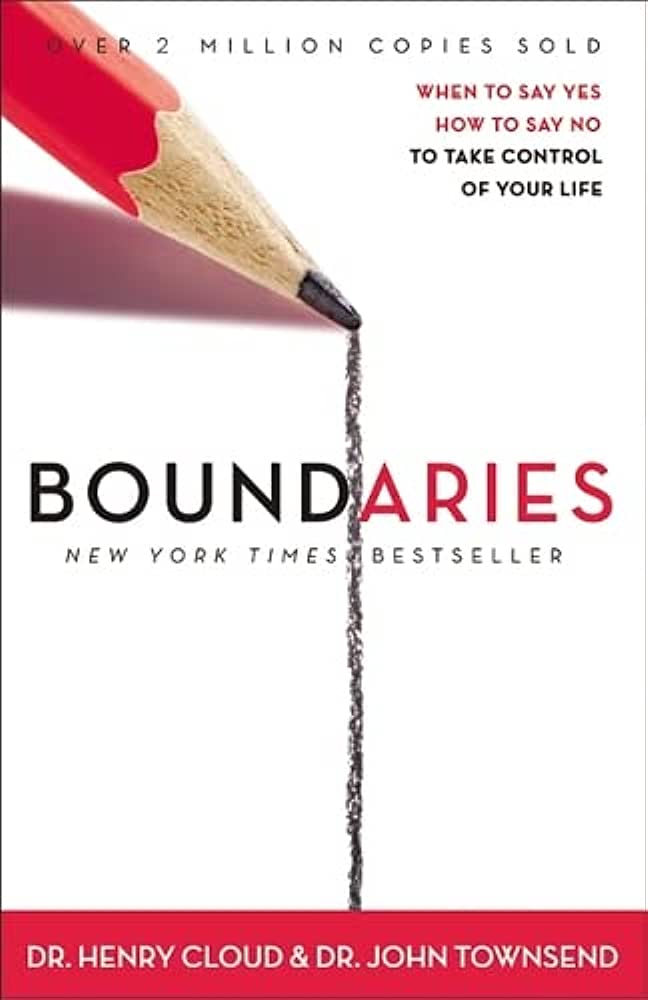“Boundaries” by Dr. Henry Cloud is a self-help book that focuses on the importance of establishing and maintaining healthy boundaries in our personal and professional lives.
This summary provides an overview of the key concepts and principles presented in the book, organized under relevant headings.
Table of Contents
Understanding Boundaries
Boundaries Defined
Boundaries are the physical, emotional, mental, and spiritual limits that define who we are as individuals and differentiate us from others.
Boundary Problems
Lack of boundaries can lead to various issues such as resentment, emotional exhaustion, codependency, and blurred personal identities.
Taking Responsibility for Your Boundaries
Recognizing Ownership
It is essential to understand that we are responsible for setting and enforcing our own boundaries.
We cannot control others, but we have the power to control how we respond to their actions.
Boundary Myths
The author debunks common myths about boundaries, such as the belief that setting boundaries is selfish or that being a “nice” person means saying yes to everything.
Developing Healthy Boundary Skills
Self-Awareness
Developing a clear understanding of our values, desires, and limits is crucial for setting effective boundaries.
It requires introspection and self-reflection.
Saying No
Learning to say no is an important skill in setting boundaries.
It involves setting limits and being assertive in communicating our needs and priorities.
Establishing Boundaries in Relationships
Types of Relationships
Boundaries are vital in all types of relationships, including friendships, family, romantic partnerships, and professional connections.
Each relationship may require different boundaries.
Boundaries in Marriage and Dating
The author explores the importance of setting boundaries in romantic relationships, including issues related to personal space, time, and individual interests.
Consequences of Boundary Violations
Boundary Violations
When others disregard our boundaries, it is crucial to establish appropriate consequences.
This may involve reevaluating the relationship, enforcing consequences, or seeking support from a therapist or counselor.
Nurturing Your Boundaries
Self-Care
Taking care of ourselves physically, emotionally, and spiritually is essential for maintaining healthy boundaries.
This includes setting aside time for rest, engaging in activities we enjoy, and seeking support when needed.
Boundary Support Systems
Building a network of supportive relationships and seeking guidance from trusted individuals can help reinforce and nurture our boundaries.
Dr. Henry Cloud | How To Set Boundaries
How Do I Establish Boundaries?
Establishing boundaries requires a deliberate and thoughtful approach.
Here are some steps to help you establish boundaries effectively:
- Self-Reflection: Take time to understand your values, needs, and limits. Reflect on past experiences and relationships to identify areas where boundaries are necessary.
- Identify Boundaries: Determine which areas of your life require boundaries. This may include personal space, time management, finances, emotional availability, or the types of behaviors you will not tolerate.
- Set Clear Limits: Clearly define your boundaries by setting specific and concrete limits. Be specific about what is acceptable and what is not, both in terms of actions and behaviors.
- Communicate Assertively: Express your boundaries to others in a clear, calm, and assertive manner. Use “I” statements to avoid sounding accusatory or judgmental. Clearly communicate your needs and expectations.
- Be Consistent: Consistency is key when it comes to boundaries. Enforce your boundaries consistently and follow through on the consequences you establish for boundary violations.
- Practice Self-Care: Prioritize self-care and make time for activities that promote your well-being. This helps reinforce the importance of your boundaries and ensures that you have the energy and resilience to maintain them.
- Seek Support: If you find it challenging to establish boundaries or face resistance from others, seek support from trusted friends, family members, or professionals such as therapists or counselors. They can provide guidance, validation, and perspective.
- Adjust as Needed: Be open to reevaluating and adjusting your boundaries as circumstances change or as you gain more clarity about your needs. Boundaries are not static and may require periodic reassessment.
Establishing boundaries is a process that takes time and practice.
It may feel uncomfortable initially, but with persistence, it becomes easier to communicate and maintain healthy boundaries, leading to improved relationships and personal well-being.
Conclusion
“Boundaries” by Dr. Henry Cloud provides valuable insights and practical advice on how to establish and maintain healthy boundaries in various aspects of our lives.
By understanding our own limits and taking responsibility for our boundaries, we can create healthier relationships and improve our overall well-being.
FAQs – “Boundaries” by Dr. Henry Cloud
Why are boundaries important?
Boundaries are crucial because they define and protect our individuality, needs, and values.
They establish limits in relationships, preventing us from being taken advantage of, and helping us maintain our emotional and mental well-being.
Boundaries enable healthy communication, respect, and personal growth.
How do I know if my boundaries are too rigid or too loose?
Finding the right balance for your boundaries requires self-awareness and self-reflection.
If your boundaries are too rigid, you may struggle with intimacy and have difficulty connecting with others.
Conversely, if your boundaries are too loose, you may frequently feel overwhelmed, taken advantage of, or lack a clear sense of self.
It is essential to assess whether your boundaries align with your values and contribute to healthy relationships.
Can setting boundaries lead to conflict?
While setting boundaries can occasionally result in conflict, it is important to remember that conflict is a natural part of any relationship.
Boundaries can actually reduce overall conflict by promoting open and honest communication.
Conflict that arises when establishing boundaries can be an opportunity for growth, understanding, and negotiation in relationships.
How do I communicate my boundaries effectively?
Effective communication of boundaries involves clarity, assertiveness, and consistency.
Clearly articulate your needs, expectations, and limits using “I” statements.
Express your boundaries in a calm and respectful manner, allowing others to understand and respect your position.
It may require practice and ongoing communication to ensure that your boundaries are understood and honored.
What if someone consistently violates my boundaries?
If someone consistently disregards your boundaries despite your efforts to communicate them clearly, it may be necessary to reassess the relationship.
Establishing consequences for boundary violations can help reinforce the importance of your boundaries.
Seek support from trusted friends, family, or professionals such as therapists or counselors to gain perspective and guidance on how to navigate the situation effectively.
Are boundaries selfish?
Setting boundaries is not selfish; it is an act of self-care and self-respect.
Boundaries allow you to prioritize your well-being and ensure that your needs are met.
By setting and maintaining healthy boundaries, you can cultivate healthier relationships built on mutual respect and understanding.
Can boundaries change over time?
Absolutely. Boundaries are not set in stone and can evolve as we grow, change, and experience new situations.
It is important to regularly reassess and adjust our boundaries to align with our current values, needs, and circumstances.
Is it ever too late to establish boundaries in existing relationships?
It is never too late to establish boundaries in existing relationships.
While it may be challenging to introduce boundaries where none existed before, open and honest communication is key.
Approach the conversation with empathy and express your desire for a healthier and more balanced relationship.
Be prepared for potential resistance or discomfort, but remember that setting boundaries is a vital part of personal growth and fostering healthier connections.
How can I overcome guilt when setting boundaries?
Guilt is a common emotion when setting boundaries, especially if you have been conditioned to prioritize others’ needs over your own.
Recognize that taking care of yourself is not selfish but necessary for your well-being.
Remind yourself that setting boundaries allows you to show up as your best self in your relationships.
Seek support from a therapist or join a support group to gain insights and strategies for managing guilt associated with setting boundaries.
Are there any resources available to help me learn more about boundaries?
Yes, there are various resources available to deepen your understanding of boundaries.
Apart from Dr. Henry Cloud’s book “Boundaries,” you can explore other books, podcasts, articles, and online courses that focus on the topic.
Additionally, seeking guidance from therapists, counselors, or support groups can provide valuable insights and practical tools for establishing and maintaining healthy boundaries.


